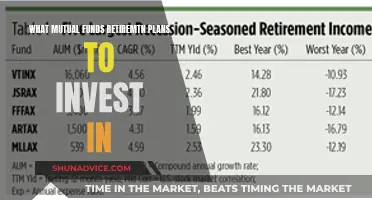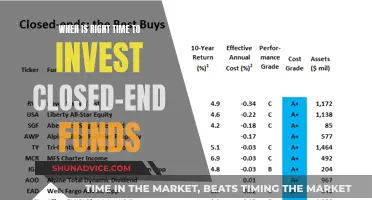
Investing in mutual funds outside of an IRA can be an effective way to save for retirement. Mutual funds are a pool of money from multiple investors, created by a financial services company and managed by a fund manager. They are a popular investment option for retirement accounts, but they can also be used outside of these accounts.
When investing in mutual funds outside of an IRA, it's important to consider the tax implications. While IRAs offer tax advantages, investing in mutual funds outside of these accounts does not come with the same benefits. However, current tax rates on qualified dividends and long-term capital gains can be considered favourable when compared to regular income tax rates.
Additionally, there are different types of mutual funds to consider, such as exchange-traded funds (ETFs) and tax-exempt bond funds. ETFs are known for their tax efficiency and are well-suited for tax-conscious investors. Tax-exempt bond funds, on the other hand, offer the benefit of tax-exempt dividends.
Before investing in mutual funds outside of an IRA, it's important to consult a financial professional to ensure that your portfolio is as tax-efficient as possible.
| Characteristics | Values |
|---|---|
| Tax benefits | No tax benefits, but you can withdraw money at any time without early withdrawal penalties |
| Investment options | Stocks, bonds, mutual funds, exchange-traded funds (ETFs) |
| Control | You have more control over your investments and can choose your own investments |
| Tax diversification | You can be more strategic about how and when you access your money |
| Contribution limits | No limits on how much money you can contribute each year |
| Tax treatment | You'll pay taxes on the income you earn from yearly dividends or interest, as well as capital gains when you sell stocks |
What You'll Learn

Exchange-Traded Funds (ETFs) vs Mutual Funds
Mutual funds and exchange-traded funds (ETFs) are similar in that they are both "baskets" or "pools" of individual securities, such as stocks or bonds, that have been grouped together as an investment. They both offer exposure to a wide variety of asset classes and niche markets and can be used to create a diversified portfolio.
However, there are some key differences between the two. ETFs trade like stocks and are bought and sold on a stock exchange, experiencing price changes throughout the day. Mutual funds, on the other hand, are executed once per day, with all investors receiving the same price. ETFs do not require a minimum initial investment and can be purchased as whole shares, whereas mutual funds have a minimum flat-rate investment amount and can be purchased in fractional shares or fixed-dollar amounts. ETFs are also more tax-efficient than mutual funds, as they generate fewer capital gains and can use the in-kind creation/redemption process to manage the cost basis of their holdings. Mutual funds are actively or passively managed by fund managers, while most ETFs are passive investments pegged to the performance of a particular index.
When deciding between ETFs and mutual funds, it's important to consider your financial goals and risk tolerance. ETFs are a good choice for those who want to make intraday trades, use stop orders, limit orders, options, and short selling, and for those who are tax-sensitive. Mutual funds, on the other hand, are better for those who invest frequently and want to fully invest the same dollar amount each time. Actively managed mutual funds are also a good choice for those looking for a fund that could potentially beat the market or for those investing in a less efficient market.
Outside of an IRA, you can invest in mutual funds through a brokerage account. This is a taxable investment account, meaning you won't get any tax breaks, but you can take money out at any time without worrying about early withdrawal penalties.
Hedge Funds: A Smart Investment for the Current Market
You may want to see also

Tax-efficiency of ETFs vs Mutual Funds
When it comes to tax efficiency, Exchange-Traded Funds (ETFs) and Mutual Funds are similar in many ways. Both are subject to capital gains tax and dividend income taxation. However, due to their inherent structure, ETFs can often be more tax-efficient than mutual funds.
Taxable Events
ETFs generally have fewer "taxable events" than mutual funds, making them more tax-efficient. Mutual fund managers constantly rebalance the fund by selling securities to accommodate shareholder redemptions or asset reallocation. This creates capital gains for shareholders, even those with an unrealized loss on the overall mutual fund investment. In contrast, ETF managers accommodate investment inflows and outflows by creating or redeeming "creation units", baskets of assets that approximate the ETF's total investment exposure. As a result, investors in ETFs are typically not exposed to capital gains on individual securities in the underlying structure.
Capital Gains Taxes
ETF managers can manage secondary market transactions in a way that minimizes the chances of an in-fund capital gains event. It is rare for an index-based ETF to pay out capital gains; when it does, it is usually due to unforeseen circumstances. Investors who sell an ETF and realize a capital gain are subject to capital gains tax. The tax rates on long-term capital gains are currently 0%, 15%, and 20%, depending on the investor's taxable income.
Taxation of Dividends
ETF dividends are taxed according to how long the investor has owned the fund. If held for more than 60 days, the dividend is considered a "qualified dividend" and is taxed at the investor's income tax rate. If held for less than 60 days, the dividend income is taxed at the investor's ordinary income tax rate, similar to mutual fund dividends.
Exceptions
Certain international ETFs, especially emerging market ETFs, may be less tax-efficient than domestic and developed market ETFs due to restrictions on in-kind deliveries of securities. Leveraged/inverse ETFs have also proven to be relatively tax-inefficient due to their use of derivatives.
Exchange-Traded Notes (ETNs)
The most tax-efficient ETF structure is ETNs. ETNs are debt securities guaranteed by an issuing bank and linked to an index. Since ETNs do not hold any securities, there are no dividend or interest rate payments made to investors while they own the ETN. ETN investors are not subject to short-term capital gains taxes like those of many mutual funds and ETFs. However, when the investor sells the ETN, they are subject to long-term capital gains tax.
ETFs are generally considered more tax-efficient than mutual funds due to their reduced number of capital gains distributions and, consequently, fewer opportunities for taxation. However, both investment vehicles have tax implications that must be considered when creating a portfolio and timing the sale of an ETF.
Mutual Funds: A Smart, Secure Investment Choice
You may want to see also

Liquidity of ETFs vs Mutual Funds
Liquidity refers to how easily an investment can be converted into cash. A highly liquid asset can be bought and sold quickly, in large amounts, and without significantly impacting its market price.
Liquidity of ETFs
Exchange-traded funds (ETFs) have higher liquidity than mutual funds, making them popular investment vehicles and convenient to tap into when cash flow is needed. ETFs can be traded intraday like stocks, and their liquidity is influenced by a combination of primary and secondary factors.
The primary factors that influence an ETF's liquidity are its composition and the trading volume of the securities that comprise it. ETFs rely on a unique creation and redemption mechanism that provides primary market liquidity. This mechanism allows for the adjustment of the ETF's supply to meet investor demand, thus maintaining price stability.
The secondary factors that influence an ETF's liquidity include its trading volume and the broader investment environment. While low-volume ETFs do not necessarily equate to low liquidity, the trading volume of an ETF is an important consideration.
Liquidity of Mutual Funds
Mutual funds, on the other hand, can only be purchased at the end of each trading day based on the calculated price known as the net asset value (NAV). This is because mutual fund shares are bought and sold directly with the fund provider, and transactions occur after trading ends for the day.
The real-time trading feature of ETFs provides intraday liquidity, allowing investors to execute trades throughout the day. In contrast, mutual funds offer end-of-day liquidity, with all orders processed at the closing NAV. This fundamental difference results in distinct liquidity experiences, catering to different investor preferences and strategies.
A Beginner's Guide to Investing in India's Top ETFs
You may want to see also

Management of ETFs vs Mutual Funds
Exchange-traded funds (ETFs) and mutual funds are both managed by experts, who choose and monitor the stocks or bonds the funds invest in. However, ETFs are usually passively managed, tracking a market index or sector sub-index, while mutual funds are typically actively managed. This means that mutual funds tend to have higher fees and expense ratios due to their higher operations and trading costs.
ETFs are priced continuously by the market and can be bought and sold like stocks, while mutual funds can only be purchased at the end of each trading day, based on a calculated price known as the net asset value (NAV). This makes ETFs a better choice for active traders. ETFs also have lower minimum investment requirements than mutual funds, which typically have minimum investments of hundreds or thousands of dollars.
Mutual funds can offer active management and greater regulatory oversight, but at a higher cost. They also only allow transactions once daily. ETFs, on the other hand, can be traded throughout the trading day and are more tax-efficient, as they are not priced at the end of the day.
Smart Mutual Fund Investments: 16K Options
You may want to see also

Sales charges of ETFs vs Mutual Funds
When it comes to sales charges, there are some key differences between Exchange-Traded Funds (ETFs) and Mutual Funds that investors should be aware of.
ETFs typically have lower fees than mutual funds. In 2022, the average expense ratio for an index ETF was 0.16%, while the average cost for an actively managed mutual fund was 0.66%. Mutual fund companies have been cutting fees to remain competitive with low-cost ETFs. ETFs also don't charge 12b-1 fees, which are advertising, marketing, and distribution costs that a mutual fund passes to its shareholders. Each investor in a mutual fund pays for the fund company to acquire new shareholders.
ETFs are also "no-load", meaning there is no purchase fee. Mutual funds, on the other hand, often charge a sales load, or a fee for allowing you to invest with them. These loads generally range from 1% to 2% and are paid to brokers as a commission for their efforts in selling the fund. Mutual funds also have a variety of other fees, including transaction fees, distribution charges, transfer-agent costs, and capital gains tax.
However, it's important to note that ETFs are traded like stocks, so you may pay a commission to buy and sell them, although there are commission-free ETFs available. Mutual funds, on the other hand, offer a low-cost alternative with no-load funds, where there is no fee and 100% of your investment goes directly into the fund.
Overall, ETFs tend to be more cost-effective and transparent in their fee structure compared to mutual funds, but it's always important to carefully examine the relative costs of any investment product before making a decision.
UK Fund Investment: A Beginner's Guide to Getting Started
You may want to see also
Frequently asked questions
Mutual funds are a great way to save money for any purpose, and they offer professional investment expertise and clout. They are also more stable than individual investments as they are diversified and less volatile.
There are thousands of mutual funds to choose from. You can opt for an exchange-traded fund (ETF), which tracks a specific index and requires less hands-on management, or you can go with a traditional mutual fund that is actively managed by a fund manager.
Mutual funds held outside of a retirement account do not have the same tax advantages as those held inside an IRA. You will not be able to benefit from tax-deferred growth, and you may have to pay capital gains taxes on any profits you make.







